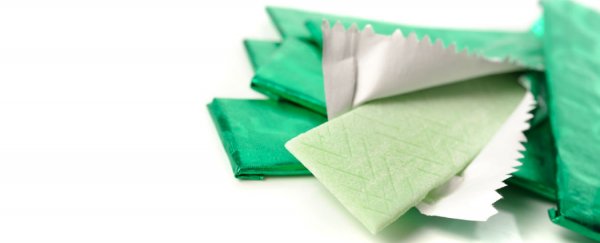When you chew sugar-free gum, you'll gather up and spit out up to 100 million bacteria. That's about 10 percent of the entire microbial population in your saliva, new research reports.
There's no denying that the chewing gum industry is in the midst of a minor sales crisis - over the past four years, sales in the US have dipped by 11 percent, and no one's really sure why. It could be that mints are more appealing, or perhaps with flavours like 'raspberry vanilla cupcake' and 'radiant pineapple blend' now saturating the market, gum has veered too far into the candy side of things to be considered a dental aid anymore.
But maybe it's time we embrace our old glutinous friend, because that stickiness appears to offer a whole lot more for our dental health than a simple mint can manage.
A team led by Stefan Wessel from the University Medical Centre at the University of Groningen in the Netherlands has found that when we chew gum, we're collecting bacteria from all corners of our mouths, and when we spit it out, the bacteria goes with it.
They figured this out by getting five biomedical engineering student volunteers to chew two different types of spearmint-flavoured sugar-free gum for different lengths of time, ranging from 30 seconds to 10 minutes. The gum was then spit out into a cup, and the bacteria that had adhered to it was analysed.
They found that up to 100,000,000 bacteria could be removed by chewing gum, which is comparable to what flossing can achieve, but in different areas of your mouth. The most bacteria were trapped in the early stages of chewing - as the chewing time progressed, the number of bacteria caught up in it declined.
"Despite an increasing diversity in species developing over time in chewed gums, there is a gradual decrease in the number of bacteria trapped in chewed gum over time," the team reports in the journal PLoS One. "This can be attributed to a decrease in bacterial concentration in saliva during chewing, shown in earlier reports."
Or perhaps, they say, "bacteria are killed during their entrapment in the gum by sweeteners like xylitol, food preservatives or flavouring agents like spearmint and peppermint, which are reported to have antimicrobial properties".
The study, partially funded by Wrigley, found that the amount of bacteria removed by chewing gum was comparable to brushing your teeth with a new toothbrush - but without any toothpaste - or flossing. "Chewing however, does not necessarily remove bacteria from the same sites of the dentition as does brushing or flossing, therefore its results may be noticeable on a more long-term [scale] than those of brushing or flossing," the researchers conclude.
It's important to note that this only applies to sugar-free gum - if you're hooked on gum with regular sugar in it, you could actually be feeding your oral bacteria, Ross Pomeroy reports at Real Clear Science. "When these microbes ferment sugars, the biofilm on your teeth grows more acidic, which, in turn, leads to cavities," he says.
Okay, I'm sold. Time for gum to return to my life. Somebody tell Lloyd Braun!
Source: Real Clear Science
